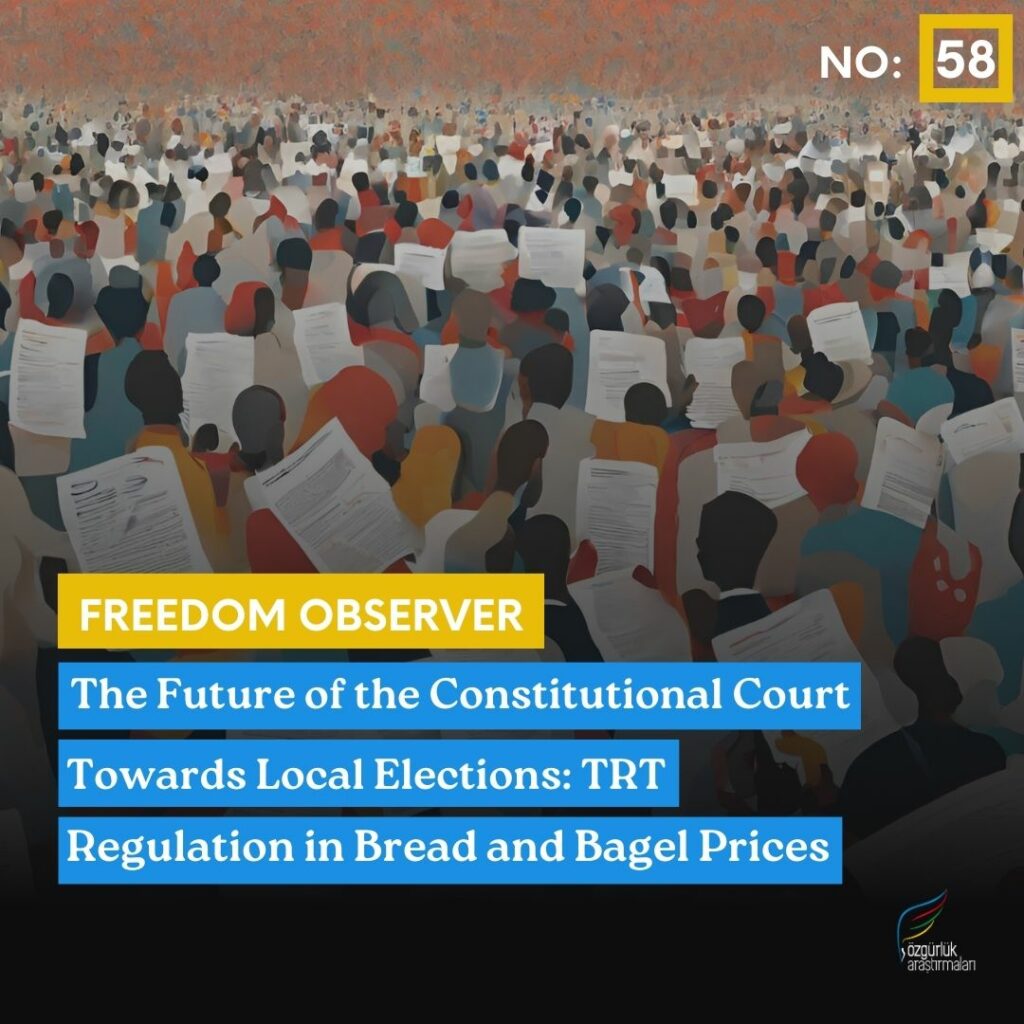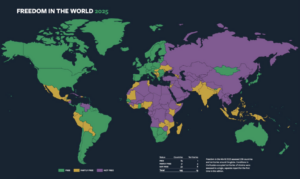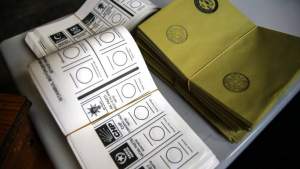
From Editor – in- Chef
With just one week remaining until the local elections on March 31, the competition between political parties, specifically between the ruling parties and the main opposition party, is intensifying. However, it is in Istanbul and Ankara where the election fervor is most pronounced.
The AKP, which sees winning Istanbul again as a matter of utmost importance, has nominated Murat Kurum, a less-than-ideal candidate, against the CHP’s Ekrem İmamoğlu, the current mayor of Istanbul. However, its true ace in the hole is Tayyip Erdoğan, the party’s chairman and President. Predictably, President Erdogan has been concentrating on the Istanbul election, mobilizing all his ministers and leveraging the electoral resources he has at his disposal as if it were a general election.
In Ankara, the second major battleground in the rivalry between the ruling party and the opposition, attention is on Turgut Altınok, the AKP candidate whose “popularity” has almost surpassed even President Erdoğan due to recent revelations of his staggering wealth. Judging by the extent of his assets, his extensive career in Ankara’s local politics has served him well. Nonetheless, this is hardly surprising given Turkey’s entrenched political landscape, which has long strayed from the notion of serving the “public interest.” Nevertheless, it appears unlikely that Turgut Altınok will be able to defeat the CHP’s candidate, the incumbent Mayor Mansur Yavaş, in the March 31st mayoral election for Ankara.
As is widely recognized, following the local elections, Turkish politics will revert to its primary focus, namely the economy, specifically addressing issues such as reducing inflation and alleviating poverty through productive welfare initiatives. However, as evidenced by the recent interest rate hike, the situation in this regard is not promising. Mehmet Şimşek and his team’s policy primarily centers around interest rate adjustments and monetary measures, lacking structural reforms. The government has yet to take substantial steps to curb public spending. Furthermore, as frequently emphasized by Ali Babacan, any economic recovery package is unlikely to yield significant results in a country lacking legal security and stability, where the courts are perceived to be influenced by political considerations.
Interestingly, there is no indication that the “new constitution” initiative, which has been on the agenda of the ruling parties for some time now, aims to address these pressing needs. Instead, it is widely presumed that the primary objective of the AKP and the MHP in this initiative is to consolidate their power. This is primarily envisioned through extending the presidential term of Tayyip Erdoğan (or securing his re-election) and reducing the authority of the Constitutional Court. In essence, the ruling coalition’s pursuit of a “new constitution” sadly lacks a genuine social agenda aimed at restoring rights, upholding the rule of law, promoting freedom and democracy, and providing a framework for resolving the country’s fundamental issues, particularly the Kurdish question.
Meanwhile, Kadir Özkaya, the current deputy president, has been elected as the President of the Constitutional Court. This position will become vacant on April 20 due to the expiration of Zühtü Arslan’s term. Unfortunately, it appears unlikely that the new President Özkaya, who cannot be described as having acted in a partisan manner in terms of his judicial stance thus far but has not consistently followed a libertarian approach, will be able to balance the current majority of the Constitutional Court. This majority seems to be influenced, to some extent, by a tendency to align with political power in its jurisprudential orientation. It remains uncertain whether Özkaya will steer the Court toward a more libertarian direction in the post-Zühtü Arslan era.
In his rather pessimistic analysis below, our colleague A. Rıza Çoban delves into the question of whether there exists a realistic possibility for the Turkish Constitutional Court to fulfill its function in the upcoming period in alignment with the universal standards expected of it in this regard.
In two distinct articles, Ömer Faruk Şen assesses TRT’s broadcasting performance on the eve of the elections and dissects the significance of the new regulation empowering the Ministry of Trade to set the prices of bread and bagels.
* Prof. Dr. Mustafa Erdoğan
The Future of the Constitutional Court
Recent days have witnessed significant developments concerning the Constitutional Court. Firstly, with the expiration of the term of office of the current President of the Court, a presidential election was held. Just two weeks ago, Kadir Özkaya, who was re-elected as deputy president on March 5, was elected as the President of the Court on March 21.[1] Özkaya is notable as the first member appointed to the Constitutional Court by President Erdoğan, and it is noteworthy that he has not consistently favored freedoms in critical decisions. It is crucial to highlight that following recent changes in the membership of the Constitutional Court, the majority of its members are now appointees of President Erdoğan.
On the contrary, recent media reports suggest that the executive branch is in the process of preparing the 9th Judicial Package, aimed at limiting the powers of the Constitutional Court.[2] It is reported that under this package, the Court would only be authorized to rule on retrials and compensations in cases of individual applications. While a comprehensive assessment cannot be made until the draft text is published, there have been occasional indications that the executive branch seeks to curtail the powers of the Constitutional Court, particularly following the Court’s Can Atalay decision. If these reports are accurate and the powers of the Constitutional Court are indeed restricted, it is evident that such a change would have significant implications for both Turkey’s political system and its international relations.
In cases of individual applications, if the Constitutional Court identifies a rights violation but fails to order effective measures to rectify it, this renders the individual’s application to the Court an ineffective remedy. The objective of remedies in human rights law is to eliminate the violation and its consequences, providing genuine redress to the victim. The most effective means of achieving this is through “restitution in integrum” — restoring the situation to its original state. Compensation serves as a form of remedy only when restitution is not feasible. For instance, in the case of a wrongful deprivation of liberty violating the right to liberty and security, the release of the individual is the only adequate remedy. Any remedy that does not facilitate the release of the individual cannot be considered effective in rectifying the violation.
There is little doubt that if the reported amendment is implemented, it would effectively eliminate the requirement to exhaust domestic remedies, including individual applications to the Constitutional Court, before applying to the European Court of Human Rights (ECtHR). Consequently, individuals whose rights have been violated would be able to petition the ECtHR directly without going through the Constitutional Court. This would essentially transform the ECtHR into an international court solely adjudicating cases originating from Turkey.
If the government is willing to take such drastic measures, it suggests a level of desperation that may extend to severing ties with the Council of Europe altogether. One can easily envision the political landscape of Turkey no longer affiliated with the Council of Europe and the implications it would have for its political regime.
Although the Constitutional Court has occasionally rendered correct decisions, it has largely ceased to function as an effective check and balance. In fact, very few of the regulations and practices contributing to the increasing authoritarianism of the regime have been deemed unconstitutional by the Constitutional Court. None of the systemic issues identified by the ECtHR in its violation judgments against Turkey in recent years have been addressed constitutionally by the Constitutional Court. Moreover, none of the systemic problems highlighted in cases such as Kavala, Demirtaş, Yalçınkaya, and Vedat Şorli, which are escalating into crises within the Council of Europe, have been resolved through decisions from the Constitutional Court.
Nevertheless, the Constitutional Court continues to maintain its status as Turkey’s most prestigious institution in the international arena. In this regard, it often serves as a façade for many of the government’s unlawful practices. The ECtHR still refrains from ruling on issues until the Constitutional Court has made a decision, effectively leaving matters pending on the shelves of the Constitutional Court. For instance, the ECtHR has abstained from ruling on conscientious objection applications for over a decade due to the Constitutional Court’s failure to address more than 40 pending applications during this period. However, on March 12, 2024, the ECtHR broke this deadlock with the Kanatlı v. Turkey judgment, declaring that the absence of legislation regulating alternative public service for conscientious objectors violated Article 9 of the Convention, which safeguards freedom of conscience.
However, it seems that the government no longer needs this legitimizing role of the Constitutional Court.[3] Because the Constitutional Court’s annulment decisions are not being carried out, and the violation decisions are not being obeyed. As in the case of Can Atalay, other judicial bodies are openly refusing to comply with the Constitutional Court’s ruling, and the government is making preparations to limit the Constitutional Court’s powers as a solution. If this amendment becomes law, the Constitutional Court will not be legally dissolved, but it seems that it will de facto be the final nail in its coffin.
* Ali Rıza Çoban – Constitutional Lawyer
Towards Local Elections: TRT
The 2024 local elections are just a week away. The importance attributed to these elections goes beyond who will win which local administration, as they have become one of the most important elections in terms of their impact on the future of Turkish politics. Candidates and their parties have embarked on an increasingly intense election campaign.
In democratic regimes, elections serve as a hallmark of a free and fair process. Unfortunately, in Turkey, the practice of free and fair elections has significantly deteriorated in recent years. Free elections entail, among other things, secure ballot boxes and the counting of votes without any fraudulent interference. While there hasn’t been a systematic breakdown in this regard in Turkey, the March 2019 local elections saw the government’s decision to annul the Istanbul elections by pressuring the Supreme Electoral Board (YSK), which ran counter to the law and democratic principles. We earnestly hope that we will not witness such occurrences that undermine democracy and erode citizens’ trust in the democratic process in the upcoming elections next week.
For elections to truly embody democratic principles, they must not only be free but also fair. Unfortunately, Turkey has a significant deficit in this regard. The AKP government, utilizing its control over public resources and power, engages in numerous activities that impede rival party candidates from competing on a level playing field. One of the most glaring examples that undermines fair competition is the TRT’s broadcasting policy (Turkish Radio and Television Corporation).
TRT, which consistently favors the AKP and MHP both in terms of the airtime allocated and the content of its news reports, even outside of election periods, continues this unequal and biased approach during elections. For instance, during the May 2023 elections, the opposition “Millet Alliance” was featured on TRT screens for a total of only 42 minutes, while the ruling People’s Alliance enjoyed a total of 59 hours of coverage.[4] By providing 85 times more coverage to the People’s Alliance, TRT, funded with public resources, violated Article 133 of the Constitution by acting against the principle of impartiality, which is a legal obligation. It is worth noting that such actions also constitute misconduct in office by public officials.
We are currently witnessing a similar pattern unfolding in the 2024 local elections. As the local elections draw near, CHP Chairman Özgür Özel has criticized TRT’s broadcasting policy. TRT allocated 29, 26, and 17 minutes to AKP candidates Murat Kurum, Turgut Altınok, and Hamza Dağ, respectively, while excluding CHP candidates Ekrem İmamoğlu, Mansur Yavaş, and Cemil Tugay. Özel, the leader of the main opposition, pointed out that since the beginning of the year, TRT has provided President Erdoğan with 2,592 minutes of coverage, whereas his own time on air amounted to only 43 minutes.[5]
In fact, RTÜK members Tuncay Keser and İlhan Taşçı filed a complaint with the Supreme Council against TRT for its biased broadcasting policy.[6] They argued that TRT should be audited for its broadcasting policy, which violates the Constitution, decisions of the Supreme Electoral Council mandating elections be held in a free and fair environment, and Law No. 6112. Moreover, the CHP’s parliamentary motion calling for “necessary measures to rectify TRT’s policy disregarding the principle of impartiality” was rejected by the votes of MPs from the ruling People’s Alliance parties AKP and MHP.[7]
Regrettably, these efforts to urge TRT to uphold impartiality have proven to be futile. With this biased approach, the ruling party and the public institutions under its influence are obstructing the electoral campaign process from being conducted fairly.
* Ömer Faruk Şen – Ph.D. – Missouri University
The Ministry of Commerce Steps in to Determine Bread and Bagel Prices
A recent regulation, published in the Official Gazette last week, has opened the door for intervention in bread and bagel prices. The amendment to Section 5 of the Regulation on Price Tariffs for Goods and Services Produced by Tradesmen and Craftsmen establishes a commission comprising representatives from relevant municipalities, Provincial Directorate of Trade, Provincial Directorate of Agriculture and Forestry, chamber of Commerce and industry or Chamber of commerce, and the pertinent chamber to assess bread and bagel prices.
In addition to requiring approval from the province-wide commission consisting of local administration, provincial organizations, and relevant chambers, this regulation mandates obtaining a positive opinion from the Ministry of Trade. Accordingly, the commission will determine prices following the Ministry’s approval.[8] This regulation effectively prevents the approval and enforcement of bread and bagel prices without the favorable opinion of the Ministry of Trade.
One of the prevailing trends in recent years has been the government’s adoption of an interventionist approach to combat the escalating cost of living. However, past experiences with similar interventions make it clear that such measures can give rise to numerous challenges for both producers and consumers. While prices ideally should be determined by the equilibrium of supply and demand in a free market, governmental intervention runs the risk of disrupting this balance.
For instance, if the prices set by the government are artificially low due to populist motives and fail to cover production costs, producers, particularly of bread and bagels, may find it economically unsustainable to continue production. Alternatively, rising input costs may compel producers to resort to lower-quality ingredients in the production of staple food items like bread and bagels in order to maintain profitability.
On the flip side, producers, in an effort to safeguard their profit margins amidst price controls or anticipating fixed incomes, may opt to offer consumers fewer choices and inferior quality products. While the TESK circular may not encompass products like stuffed bagels, kashkaval bagels, olive bagels, and butter bagels, the overall quality of traditional bagels could still suffer. Factors such as flour and sesame, whose prices are determined by foreign currency, may significantly contribute to declining quality standards. In fact, we’ve observed a similar trend with bread in the past, where quality has often been compromised due to cost increases and price suppression.[9][10]
While such regulations might appear beneficial to consumers in the short term, they risk damaging the free market economy and interfering with market mechanisms in the long run. This can lead to disruptions in market dynamics, an inability to cover costs, decreased product diversity, and threaten the survival of small businesses—a sector already under significant strain in Turkey in recent years.
For these reasons, we urge the government to address the root causes of the high cost of living and pursue orthodox policies instead of resorting to temporary, populist solutions.
* Ömer Faruk Şen – Ph.D. – Missouri University
1 https://www.anayasa.gov.tr/tr/duyurular/anayasa-mahkemesi-baskan-secimi/
2 https://www.youtube.com/watch?v=8sRHsoN0KnA
3 https://hudoc.echr.coe.int/eng?i=001-231540
4 https://www.evrensel.net/haber/488955/trt-cumhur-ittifakina-millet-ittifakindan-85-kat-fazla-yer-ayirdi
5 https://gazeteoksijen.com/secim-2024/ozelden-trt-tepkisi-kuruma-29-dakika-imamogluna-0-204121
6 https://www.cumhuriyet.com.tr/siyaset/rtuk-uyeleri-trtyi-ust-kurula-sikayet-etti-2180305
7 https://www.cumhuriyet.com.tr/siyaset/chpnin-trt-grup-onerisine-akp-ve-mhpden-ret-2180523
8 https://www.birgun.net/haber/resmi-gazete-de-yayimlandi-ekmek-ve-simit-fiyatinin-belirlenmesinde-yeni-donem-513868
9 https://www.takagazete.com.tr/ekmegin-kalitesi-dusuyor
10 https://www.patronlardunyasi.com/yazdir/kriz-ekmek-uretimi-bile-geriletti





